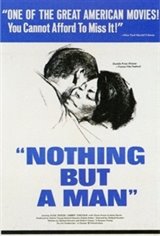Nothing But a Man

Rotten Tomatoes® Score
![]() 98%
98%
![]() 88%
88%
| In Theaters: |
|
1h 32m | Drama, Romance
A landmark independent film, Nothing but a Man is the first dramatic story featuring a largely black cast created for an integrated audience (the work of black filmmakers such as Oscar Micheaux was intended for audiences who patronized black-only theaters). White filmmakers Michael Roemer and Robert M. Young traveled through the South in 1962 in search of ideas for a fiction feature set during the growing turbulence of the civil rights era. Their story, based in Alabama but shot in southern New Jersey, is only tangentially related to the movement toward equality. Duff, an itinerant black railroad laborer (Ivan Dixon), romances and marries Josie, a small-town preacher's daughter (Abbey Lincoln). Duff insists on being treated with respect, but his stance is personal rather than political. After he settles down in the town with Josie, he comes up against white bosses who want to make sure he knows his place and black men such as Josie's father who don't want to rock the boat for fear of losing what little advantage they have. Duff's relationship with his own father (Julius Harris), a broken-down drunk living in Birmingham, teaches him valuable lessons about dignity and self-worth. The film was lauded at both the New York and Venice festivals but received limited release in theaters specializing in foreign and independent film. However, word of mouth in the black community (where Nothing but a Man was for years a staple on the 16 mm rental market, in the days before VCRs) and continued attention by film historians have ensured the status of Nothing but a Man as a pioneering and enduring work.
| Director: | Michael Roemer |
| Producer(s): | Robert Rubin |
| Cast: | Ivan Dixon, Gloria Foster, Abbey Lincoln, Yaphet Kotto, William Jordan, Julius Harris, Melvin Stewart, Stanley Greene, Martin Priest, Leonard Parker, Helen Lounck, Helene Arrindell, Milton Williams, Charles McRae, Ed Rowan, Tom Ligon, Dorothy Hall |
